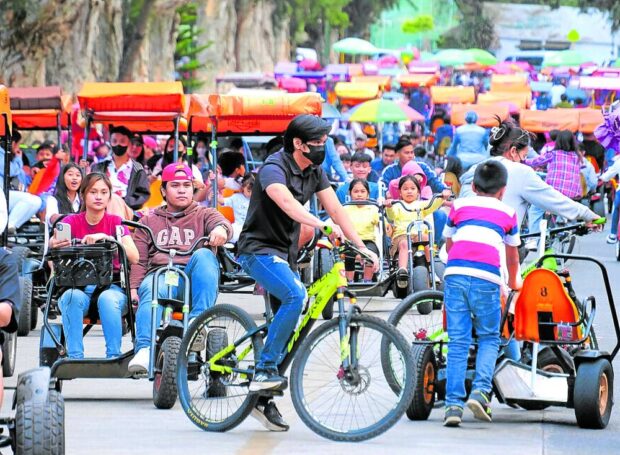
CROWDING | Travel and other economic activities have helped Baguio City recover from the coronavirus pandemic, as shown in this photo taken in Burnham Park in January. But the summer capital will again require the mandatory use of face masks indoors to curb new infections. (Photo by NEIL CLARK ONGCHANGCO / Inquirer Northern Luzon)
BAGUIO CITY, Benguet, Philippines — Mayor Benjamin Magalong on Tuesday assured that the local government would not control the movement of people or limit gatherings and events as the city prepares to reimpose the mandatory wearing of face masks indoors.
In a statement, Magalong said requiring people to wear face masks indoors would protect not only Baguio residents but also “residents of neighboring places, as well as visitors from other localities.”
“We will just take extra precautions [against COVID-19]. Let’s also avoid handshakes and do fist bumps instead,” the mayor stressed.
Residents and tourists here said bringing back the mandatory use of face masks would have to address its impact on various sectors, including tourism, schools and workplaces.
Tourists booked in hotels may be required to wear it in hallways or common areas when they leave their rooms, a local businessman told the Inquirer on Tuesday.
“We are waiting for guidelines because we do not know what to enforce inside our hotels without antagonizing current guests or future visitors,” said the businessman, who requested not to be named as the city has yet to release its new masking guidelines.
The Department of Education has yet to release any advisory as to whether it would require public school students to don masks for the remaining months of the school year because of the new local health policy.
All grade school and high school students have been attending in-person classes without masks, after enduring three years of distance learning because of the quarantines.
These are issues being sorted out by the Baguio government, which has started drafting an executive order reinstating the mandatory use of masks when indoors to help stem the slight increase in COVID-19 infections.
Magalong first announced his plan to bring back the mask regulations during the flag raising ceremony on Monday.
Arcturus strain
The mayor reflected on the detection last month of the highly infectious COVID-19 strain XBB.1.16 (also called Arcturus) which was detected in the country on April 25, although its impact on increasing cases has yet to be determined.
Magalong said the city’s data analysts and epidemiologists forecast an increase in transmissions in the next three to four weeks.
As of May 10, Baguio hospitals were treating 60 active cases of COVID-19, five of which were classified as “reinfections,” according to the city health services office.
Across the Cordillera from May 8 to May 14, the Department of Health (DOH) recorded 247 active COVID-19 cases, 129 of which were located in the summer capital, which was the highest in the region, followed by the most adjacent provinces of Benguet (44) and Mountain Province (35).
The DOH tally for that period also recorded a fatality in Baguio and another in Kalinga province.
Underreported?
Infections may be underreported, according to DOH epidemiology nurse Karen Lonogan during a May 10 briefing.
She said the recent infections occurred in closed or confined settings like hospitals, schools, call centers, shopping malls, “industrial workplaces,” and “hospitality workplaces.”
“Kailangan mas maingat na tayo (We need to be more careful),” Magalong said.
But he stressed that the city’s health-care utilization rate remained low at 12.66 percent (with seven of 44 intensive care unit beds being utilized and 41 of 335 regular hospital beds currently occupied). The city’s vaccination rate also remains high.
The mandatory use of face masks was tackled by Malacañang last year. Described as the last travel restriction imposed by the national government because of the public health emergency, President Marcos authorized the inter-agency task force to make mask-wearing “voluntary,” except when using public transportation or when inside hospitals and other medical facilities.

